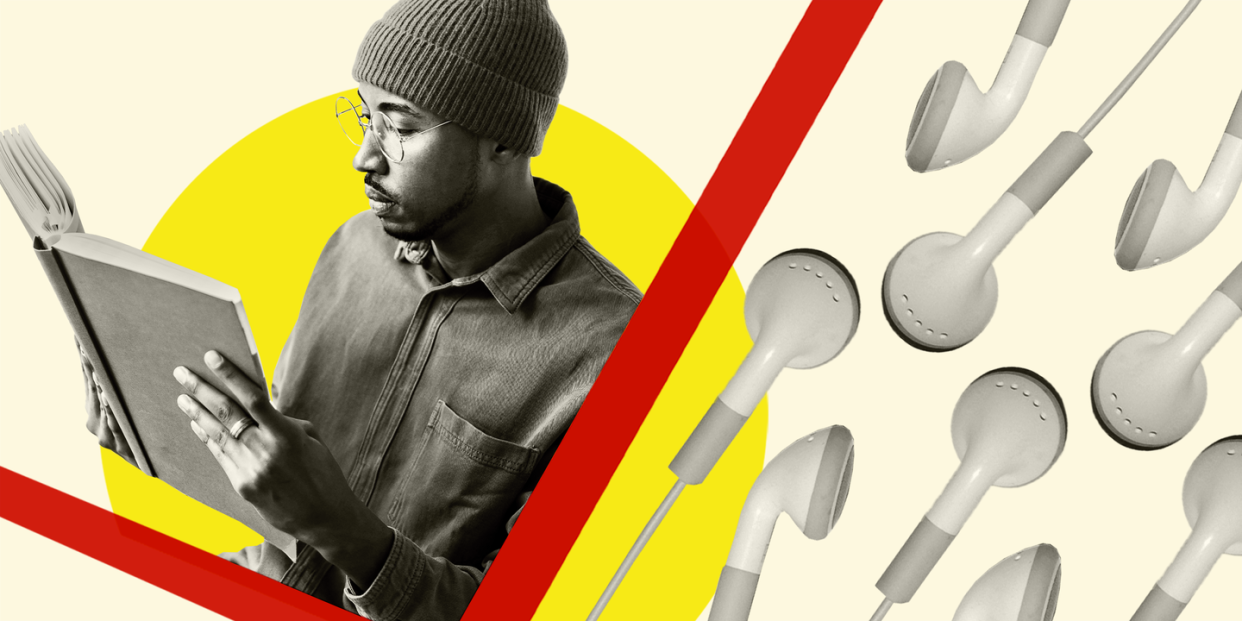The Life-Changing Power of Actually Quitting a Book or Podcast

You've heard about the Great Resignation, but quitting your job is just one way that throwing in the towel can be a great way to get ahead. This story is part of a Men's Health series on how real-life quitters became winners—and how you can join them.
A FEW YEARS AGO, best-selling horror novelist Joe Hill, whose comic series Locke and Key is now on Netflix, and whose short story, The Black Phone, has been adapted into an Ethan Hawke movie set for release in 2022, had a simple realization that has utterly improved his life.
“I'm 49 years old now and I would say right up into my early forties, I still felt if I didn't finish a book that I had started reading that it was a personal failing,” he says. Today he sees things differently. Hill read about fifty books in 2021, but he also proudly quit on two. “I do think it's become easier for me because I'm older now, and I'm aware on some level I have less time ahead of me than I have behind me.”
Hill won’t name what books he didn’t like. “I'm of the view that it’s best to keep things anonymous to protect the guilty,” he says. But his slightly dark if obviously clever perspective makes sense: Even seemingly basic forms of escapism like books or podcasts hijack valuable time and energy. The clock is tick, tick, ticking away during every minute of every hour of every day, so it's important to relax in ways that both a) feel practical, and b) make us happy.
Of course, Hill’s not alone in his assessment. Psychologist Gregory Scott Brown, M.D., the director of the Center for Green Psychiatry, says he is totally fine with people quitting books and podcasts; in fact, he sees it as a way to put ‘quitting’ into practice in a lower-stakes way, before potential future situations where quitting might not be so easy. “Sometimes quitting is necessary,” Brown says. “If we're never quitting, we're never moving forward. So that could mean quitting a podcast, deciding it's time to put down a book, or even quitting a bad habit like smoking.”
Brown says that it’s especially important for people to focus on that ‘moving forward’ part. How can we turn quitting into a positive? “I tell my patients that if they're going to quit something, then think about what they might want to replace it with,” Brown says. “Maybe you're done with one podcast, but you pick up a new book instead.”
This sort of thing has worked for the psychologist himself too. In the winter of 2004, Brown says he was an overwhelmed and burnt out music student at the Juilliard School. Midway through his third year of college, he decided he’d had enough: He quit, moved back to his hometown, and started a different major at a different university. “If I were to say that quitting was an easy decision, or an easy process in its aftermath, that would be disingenuous,” he says. But it was that path, he says, that led to him moving forward with medical school and now working to help others on their own journeys.

For me personally, the pandemic reshaped my relationship exactly what I’ll prioritize inside my earbuds. Before Covid-19, my daily routine included an hour commute every day to and from work, and a 20-minute walk to and from the gym. That gave me time not only for my favorite sports podcast (ESPN’s Fantasy Focus: Football), but also interesting or funny interviews with some of my favorite people from the world of pop culture (usually on WTF With Marc Maron or NPR’s Fresh Air). Once I began working and working out at home, though, I realized that I really only craved listening during my brief morning workout and post-work dinner prep.
I’m a Fantasy Football maniac so I couldn’t let go of Focus. My solution for all the other stuff? Simply get selective. The good thing about many podcasts is they aren’t serial. When Steve Buscemi does an interview with Maron? Obviously I'm listening. But when it's with someone else that I’d rather skip on? I give myself permission to do so. (My relationship with TV is a little different because I prioritize the shows that I'm afraid might get ruined by spoilers. But otherwise I've learned to trust that the rest will still be there, thanks to streaming on-demand.)
For his part, Hill has also had one other realization: His fulfillment from reading doesn’t hinge on always seeking something new—it can happen by revisiting something that’s really satisfying, like a work from the legendary horror novelist Stephen King, who just so happens to be his father. “When I've read something that I thought was a total grind, a lot of times that's when I'll reach for one of my dad's books, because I know it will instantly get me back on track, that I'll be swept away into a thrilling narrative with characters I love and great situations. And that's what I want,” he says.
The point is: We all know the that disappointing feeling of finishing a book, getting to the end of a TV series, or listening to the last episode of a podcast, only to realize that the experience was a grind. Thankfully, the world of possibilities for what comes next is suddenly open. If you decide to quit something and just do it, the door to that world gets unlocked a whole lot sooner.
You Might Also Like

